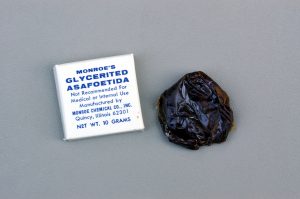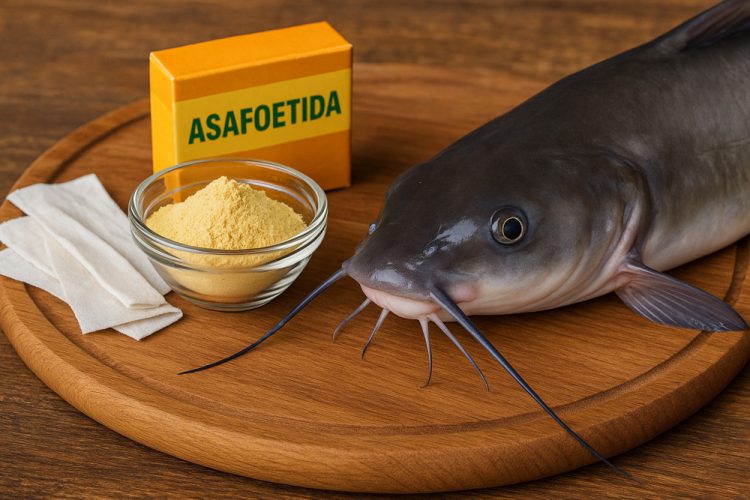Old-school stinkbait meets big whiskers: Asafoetida, the legendary “devil’s dung,”
might just be the smelliest (and most effective) catfish bait you’ve never tried.
The Stink That Brings the Bite
Story and photos by Keith “Catfish” Sutton
Catching catfish with asafoetida.
Decades ago, embarrassed children often went to school wearing little cotton pouches on strings around their necks. These “acifidity bags” contained a foul-smelling resin known as “devil’s dung,” believed to ward off colds and flu. Made from plants native to central Asia, asafoetida—as it’s properly known— also found its way into the tackleboxes of Southern anglers.
“If it stinks, throw it in,” bait makers often said. And they meant it.
Fishing Memories and Foul Smells
I can testify to asafoetida’s effectiveness. Back in the 1960s, several men I fished with carried powdered asafoetida in small tins. A bit of the powder was dissolved in warm water, then strips of cloth were soaked in the pungent solution. Those soaked rags were draped over hooks or wrapped in mesh and dropped to the bottom. The stink was terrible—but the catfish didn’t mind. We caught plenty using this old-school scent bait.
Despite its reputation as one of the worst-smelling substances known to man, asafoetida is actually a key ingredient in many Indian and Middle Eastern dishes. It’s often used in lentils and curries, where its cooked flavor is said to resemble leeks or onions. The raw resin, though, has a sulfurous reek that could stop traffic—and call in catfish.
What Is Asafoetida?
Asafoetida comes from the sap of plants in the Ferula genus—relatives of fennel and parsley. The sticky resin is harvested from the roots and dried into chunks or powder. Rich in sulfur compounds, it’s this chemical makeup that gives it its notorious odor, sometimes compared to rotten garlic or decomposing onions.

Used medicinally for centuries, asafoetida has been a folk remedy for everything from asthma to indigestion. In Appalachia and parts of the South, people wore “acifidity bags” around their necks to ward off illness. It was thought that the stench would drive away disease, or maybe evil spirits. Somewhere along the line, someone decided to try it on fish—and the idea stuck.
Folk Remedies Meet the Riverbank
In rural communities, the lines between folk medicine and fishing wisdom often blurred. If something was pungent enough to drive off sickness, why wouldn’t it draw in a whiskerfish? Old-timers believed that strong smells helped attract catfish, especially in slow-moving, muddy water where visibility was low. Whether it was Limburger cheese, fermented minnows or asafoetida, they figured stink equaled success.
The Science of Stink
Catfish don’t rely on sight to hunt. Instead, they “taste” and “smell” the water using an intricate network of chemoreceptors located on their skin and barbels. These specialized cells can detect trace amounts of scent from far away. That’s why stink baits have stood the test of time.
Asafoetida, with its rotten-egg funk and powerful aroma, acts like a homing beacon for catfish. Even in dark, debris-laden water, a soaked strip of cloth or a sponge doused in asafoetida water can bring in channel cats, blues and even big flatheads looking for something to sniff out and swallow.
Make Your Own Asafoetida Catfish Bait
Want to give it a try? Making your own asafoetida bait isn’t hard. Just be sure to mix it up outdoors.
You’ll need:
- 1 teaspoon powdered asafoetida (available online or at Indian grocery stores)
- 1 cup warm water
- Optional add-ins: garlic powder, cheese spread or fish oil for extra scent
- Strips of cloth, sponge chunks or dough bait
Instructions:
- Stir the powdered asafoetida into the warm water until dissolved.
- Mix in optional ingredients if desired.
- Soak your cloth strips or bait materials in the solution.
- Store in a sealed jar until ready to use.
- Wrap bait around your hook or stuff it into a mesh bag or nylon stocking before casting.
Pro tip: Keep a clothespin handy for your nose—and maybe a second one for your fishing buddy.
Asafoetida vs. Store-Bought Baits
Plenty of commercial stink baits are on the market, ranging from punch bait to dip bait, many with time-tested formulas. So how does asafoetida compare?
While it’s not as common in modern angling circles, asafoetida has a unique scent profile that may attract catfish that have grown wary of standard offerings. It’s especially appealing to anglers who enjoy making their own baits or want to experiment with old-school techniques. Plus, a little goes a long way. A small jar of the powdered resin can last through dozens of trips.
A Challenge for the Curious Angler
If you’re the kind of angler who likes to experiment, why not try a “Stinkbait Showdown”? Fish one rod with your usual commercial bait and another with asafoetida-based homemade bait. You might be surprised by the results. And if nothing else, you’ll come home with a good story—and maybe a few less friends willing to share your boat.
Final Sniff
In a world where flashy lures and high-tech sonar dominate, there’s something deeply satisfying about reaching back into fishing history and pulling out an old secret. Asafoetida may smell like something dredged from the bottom of a swamp, but to a hungry catfish, it’s hard to resist.
Just be sure to wash your hands before you stop for a burger on the way home.



